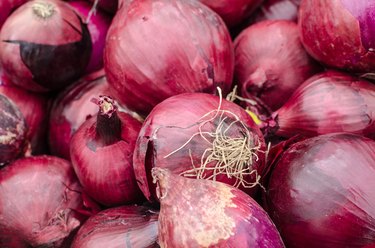
Body odor is a nuisance and can cause embarrassment. Stress, exercise and high temperatures are normal causes for sweating, also known as perspiration. Odor occurs when perspiration encounters bacteria on the skin. Excessive sweating, or hyperhidrosis, and little or no sweating, also known as anhidrosis, are medical conditions that require treatment. Strong-smelling foods such as onions may cause body odor.
Causes of Body Odor
Video of the Day
The body has two types of sweat glands -- the eccrine glands and apocrine glands. The eccrine gland is directly open to the skin surface and covers the majority of the body. It produces odorless sweat primarily composed of sodium chloride that helps reduce your body temperature. The apocrine glands cover areas with abundant hair follicles such as the armpits, groin and scalp. These glands secrete fatty sweat that mixes with bacteria, which causes an unpleasant odor. According to Columbia University Health Services, food such as garlic, curry and onions contribute to body odor.
Video of the Day
Onions
Foods with a strong smell such as onions and garlic is high in sulfuric acid. The oil secreted from onions mixes with the fatty sweat released in the apocrine glands. The strong smell from onions contributes to body odor in the apocrine glands. Onions may also cause foul breath. Cooking the onions may cut down on their odor-causing properties, according to Get Healthy Palm Beach.
And if you counteract the effects of onion on body odor, it might be worth while. There are many health benefits of onions, including regulating blood sugar, strengthening bones and warding off disease.
Treatment
Over-the-counter products, such as antiperspirant and deodorant help combat body odor and sweating. The Women and Children's Health Network notes that using antiperspirants containing aluminum-based compounds help temporarily block sweat glands and a deodorant to eliminate the odor. Aluminum chloride prescriptions are available if over-the-counter medication does not work. Side effects include redness and itchy skin.
Lifestyle Changes
Columbia University suggests bathing daily with deodorant or antibacterial soap, reducing your consumption of strong-smelling foods such as onion, quitting smoking and adding magnesium or zinc to a healthy diet consisting of vegetables and whole-grain foods.
Is this an emergency? If you are experiencing serious medical symptoms, please see the National Library of Medicine’s list of signs you need emergency medical attention or call 911.